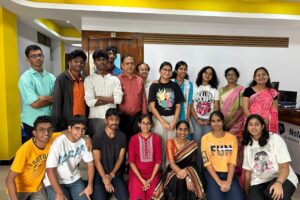
Why Olympiads in Primary Classes Are a Game-Changer for Young Minds
Olympiads are not just competitive exams; they’re a gateway to developing analytical thinking and problem-solving skills from an early age. As a chemistry professor, and mentor at No More Classes Institute, I have witnessed firsthand how Olympiads shape young minds and prepare them for future academic challenges.
1. Building Analytical and Logical Thinking
Primary-level Olympiads, like the National Science Olympiad (NSO) and International Mathematics Olympiad (IMO), introduce complex problems that go beyond textbooks. They encourage children to think critically, analyze situations, and arrive at logical conclusions — skills that are essential in every field, whether science, technology, or beyond.
2. Strengthening Conceptual Understanding
Olympiads focus on application-based learning. Rather than rote memorization, students are encouraged to apply concepts in real-life situations. This lays a solid foundation for subjects like Mathematics and Science, which will benefit them immensely in higher classes.
3. Boosting Confidence and Competitive Spirit
Participation in Olympiads at an early age nurtures a healthy competitive spirit. Children learn to handle pressure, improve their time management, and develop resilience — qualities that are vital in competitive exams like NEET, JEE, and other entrance exams later in life.
4. Exposure to National and International Standards
By competing at national and international levels, students gain exposure to diverse problem-solving approaches. This broadens their perspective and prepares them to face challenges beyond the classroom.
5. Recognition and Motivation
Success in Olympiads provides recognition and rewards, boosting a child’s morale and inspiring them to excel further. Recognition at a young age instills a sense of accomplishment and motivates them to strive for academic excellence.
6. Developing Future Leaders and Innovators
Olympiads cultivate an early interest in subjects like Science, Mathematics, and Technology. Many students who excel in these fields during their formative years go on to pursue careers in research, engineering, and medicine, contributing significantly to society.
7. Building Soft Skills
Olympiads also help develop effective communication skills by encouraging students to discuss solutions with peers, teamwork by collaborating on group projects, and adaptability by approaching problems from different perspectives. These essential traits prepare students for success in academics and beyond.
8. Lifelong Love for Learning
Most importantly, Olympiads spark a lifelong love for learning and problem-solving. This curiosity and drive to explore new concepts benefit children beyond academics, helping them develop the confidence to take on future challenges.
Conclusion
Introducing Olympiads in primary classes is not just about winning medals — it’s about nurturing young minds, encouraging curiosity, and instilling a love for learning. By participating in Olympiads, children develop life skills that help them excel academically and professionally.
Get started with Olympiad preparation and unlock limitless potential!



